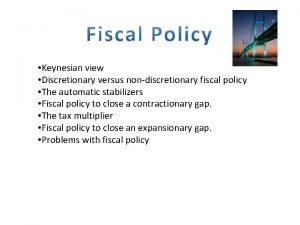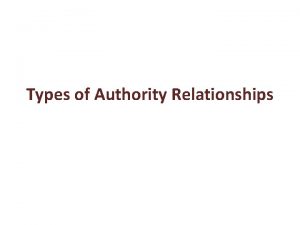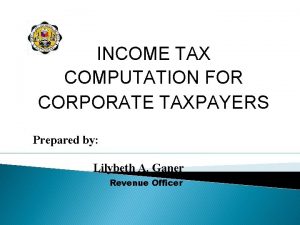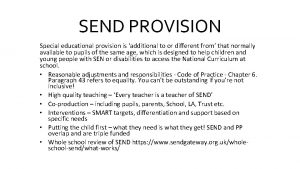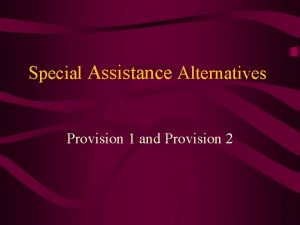Discretionary Authority A Discretionary Authority Provision gives a










- Slides: 10

Discretionary Authority • A Discretionary Authority Provision gives a party a choice or the permission or the authorization to do something. • If your client will be the party exercising the authority, draft the contract so that you give your client as much discretionary authority as possible. • If your client will be the party exercising the authority, draft any condition that goes along with the discretionary authority as broadly as possible as well. • If on the other hand, your client is not the one exercising the discretionary authority, draft the grant of the authority as narrowly as possible. • Also, draft any condition to the exercise of the authority, so that it applies only in the most limited circumstances.

Discretionary Authority • Unfettered grant of discretion- here, one of the parties has the sole discretion in choosing to do or not do something. • However, discretion can be granted with constraints that require a party to be reasonable in his or her exercise of discretion. • The word may can be used to signal the grant of discretionary authority. EX: If the owner defaults on the loan for three consecutive months, the bank may repossess the vehicle. • When using the word may, make sure that the actual use of the word makes the point that you want it to make as sometimes, using the word may alone, without more, may not give a provision the same meaning that you would like for it to have.

Discretionary Authority • A party’s exercise of discretionary authority may be subject to the satisfaction of one or more conditions. EX: Marge may buy Lisa a new saxophone if she makes the Springfield Elementary School Honor Roll, and does all of her chores. • NOTE: Be aware that a grant of discretionary authority can pose as a declaration in the same way that covenants can pose as declarations. • Declarations should be drafted in the present tense because they have continuing effect throughout a contract’s life. EX: Often, things such as job descriptions and certain employee salaries will be standard within a contract, and will not change over time. Salary. The president’s salary is at a rate of $200, 000 per year.

Will and Shall • • • Use shall to indicate a covenant. Use will to indicate the future. If a covenant has a negative subject, then use the word may. When to Use Will: 1. If a provision states a party’s opinion, determination, or belief about the future. 2. If a provision is a covenant that includes a statement about the future. 3. If a provision is a right that includes a statement about the future. 4. If a provision grants a party discretionary authority with respect to some future event. 5. If a declaration includes a statement about intent. 6. If a provision warrants performance or a future state of facts.

Will and Shall When to Use Shall: • Shall should be used only to signal an obligation. RULE #1: If a party (look for the name of an individual, entity, corporation) does not precede the word shall, then the usage of shall is incorrect. EX: (correct)—The landlord shall, Paul shall, the corporation shall EX: (incorrect)—the home shall, the lot shall, the vehicle shall

Will and Shall Exceptions to the shall rule: RULE #2: When a party precedes the word shall, shall is usually correct, but there at least 3 exceptions: 1. The use of shall is wrong if a party precedes shall and shall is coupled with a form of the verb to have. EX: (wrong) Bart shall have obtained Homer’s consent. (correct) Bart must have obtained Homer’s consent. 2. The use of shall is wrong if a party proceeds shall and shall is coupled with a form of the verb to be. EX: (wrong) Bart shall be excused from clearing the dinner table. (correct) Bart is excused from clearing the dinner table.

Will and Shall Exceptions to the shall rule: 3. The use of shall is wrong if a party precedes shall in a clause that establishes the circumstances under which an event may occur. NOTE: Clue words and phrases that begin these clauses include when, if, in the event of, and that. EX: (wrong)- Late Payment. If the Borrower shall fail to pay interest when due, the Bank may declare the Borrower to be in default. (correct)- Late Payment. If the Borrower fails to pay interest when due, the Bank may declare the Borrower to be in default. NOTE: Do not consider these 3 exceptions as the only exceptions.

Will vs. Shall: Comparison Chart SHALL WILL • 1. 2. 3. If a party does not proceed the word shall, the usage of shall is always wrong. Even when a party proceeds the word shall, the usage of the word is generally correct, except in 3 instances : If shall is coupled with the verb to be, shall is wrong. If shall is coupled with the verb to have, shall is wrong. If shall is in a clause that establishes a circumstance, shall is wrong (look for words like: when, if, in the event of, and that) 2. 3. 4. 5. 6. If a provision states a party’s opinion, determination, or belief about the future. If a provision is a covenant that includes a statement about the future. If a provision is a right that includes a statement about the future. If a provision grants a party discretionary authority with respect to some future event. If a declaration includes a statement about intent. If a provision warrants performance or a future state of facts.

Practice Makes Perfect! ORIGINAL VERSION: Publicity. The parties agree that no publicity release or announcement concerning the transactions contemplated hereby shall be issued by any party without the advance consent of the other, except as such release or announcement may be required by law, in which case the party making the release or announcement shall show the release or announcement in advance to the other party. REWRITE: Publicity. Neither party may issue a publicity release or announcement concerning the transactions that this agreement contemplates without the other party’s advance consent, except if the publicity release or announcement is required by law. In that case, the party making the publicity release or announcement shall show it in advance to the other party.

Practice Makes Perfect! ORIGINAL VERSION: Delays. The Contractor agrees that it shall be accountable for promptly notifying the Owner in writing of any event that may delay completion of the Building. The notice shall explain why the delay has occurred and its estimated duration. REWRITE: Delays. The contractor shall promptly notify the Owner of any event that may delay completion of the Building. In the notice, the Contractor shall explain why the delay has occurred and its estimated duration.

